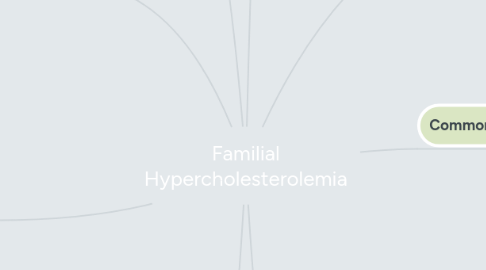
1. Pathophysiology
1.1. Majority of FH cases caused by a loss-of-function mutation in the LDL-receptor gene (LDL-R) on chromosome 19
1.1.1. Mutations in this gene reduce the clearance of LDL particles from the blood due to a decreased LDL-R activity, leading to high LDL-C levels
1.2. May be caused by a mutation in the gene encoding apolipoprotein B (APOB) on chromosome 2
1.3. Another defect is one encoding a member of the proprotein convertase family, PCSK9 on chromosome 1p32
1.3.1. Mutations in this gene can be associated with low or high LDL-C levels through different mechanisms affecting the recycling of LDL-R
2. Causative Factors
2.1. Inherited in an autosomal dominant manner
3. Treatments
3.1. Diet - reduce saturated fat, trans fat, cholesterol
3.2. Weight Loss
3.3. Exercise
3.4. Medications (usually necessary in combination to treat FH)
3.4.1. Statins
3.4.2. Bile acid sequestrant resins
3.4.3. Ezetemibe
3.4.4. Nicotinic acid
3.4.5. PCSK9 inhibitor
3.5. LDL apheresis (usually necessary only for homozygous FH)
3.6. Liver transplant
4. Risks
4.1. An important cause of heart disease
4.1.1. 75% of mean with FH develop coronary disease and 50% had a fatal MI by 60 years old
4.1.2. 45% of women with FH develop coronary disease and 15% had a fatal MI by 60 years old
5. Genetic Details
5.1. One of the most common autosomal dominant disorders
5.1.1. Heterozygous FH
5.1.1.1. Affects 1:500 individuals
5.1.1.2. FH inherited from only 1 parent
5.1.1.3. This person has a 1 in 2 chance to pass on the mutated gene to each of his/her children.
5.1.2. Homozygous FH
5.1.2.1. Affects 1:1,000,000 individuals
5.1.2.2. FH inherited from both parents (a much more severe form of FH)
5.1.2.3. Each of this person's children will inherit one copy of the mutated gene and will have heterozygous FH
5.2. >90% of cases are caused by gene mutation located on chromosome number 19
5.2.1. Contains the information for a protein called LDL receptor that is responsible for clearing LDL from the blood stream

